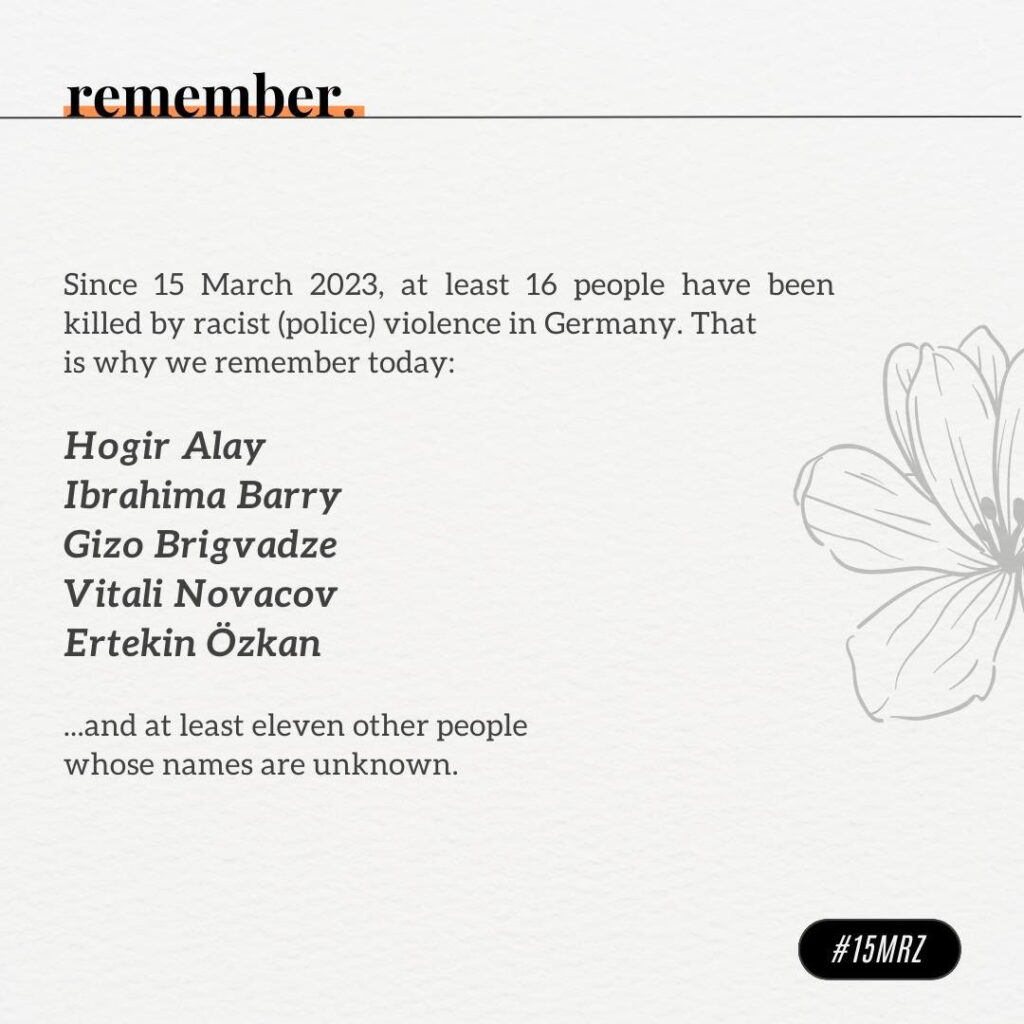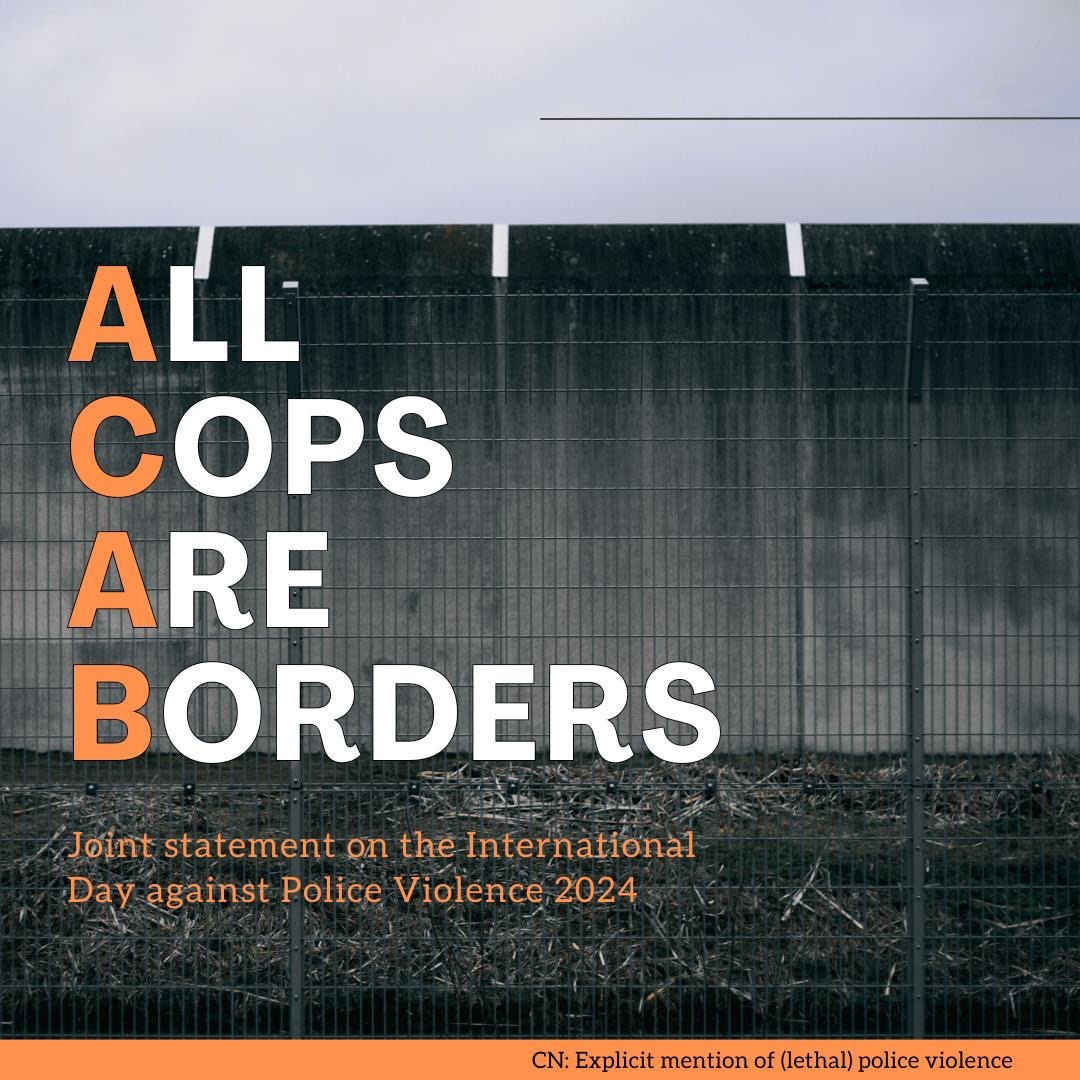[CN: Explicit mention of (lethal) police violence]
Deutsche Version: hier
All police officers represent borders. This is more or less what it means, but it implies much more. The police are the authority that implements the deprivation of rights and marginalisation of people based on racist, ableist, sexist and economic criteria in everyday life. This year’s International Day against Police Violence, on 15 March 2024, will therefore focus on the borders embodied by the police.
They ensure differentiation and the establishment of borders through the use of force and turn them into a public spectacle. This begins with degrading controls, continues with criminal prosecution and deprivation of freedom and ends fatally. Sometimes they are located at national borders, but very often these borders are mobile and arbitrary. Both in border regions and outside Germany, the federal police use pushbacks and deportations regardless of legal and ethical boundaries in order to escalate the power of the state against people on the move.
However, these borderlines also run through our cities where the police continue to criminalise people with their racist practices. The fabrication of supposed dangers and pre-existing gadjé racism, anti-Muslim racism, anti-Black racism, “clan” criminalisation and the criminalisation of homeless or precariously living people, people with disabilities or undocumented people and their intersections play a central role in this. This criminalisation and everyday violence create divisions in our cities that make places differently safe and accessible for all of us. They may manifest through controls in public spaces, the declaration of dangerous places, forced evictions or the criminalisation of migrant self-organisation and the banning of their symbols.
And the police kills. Sometimes within only a few days we hear about deaths in police custody, about people who have been suffocated in their homes or on the streets, killed with tasers or with firearms, or about people who have died or taken their own lives while fleeing for fear of deportation. We rarely know their names, we almost never hear their stories. They are almost always people experiencing racism, often people with a history of flight and uncertain residence status, people in precarious living situations, people in difficult psychological or social situations. This is not a coincidence, it’s systemic.
If people survive such violent encounters with the police, they suffer deep injuries – both physical and mental – and are often threatened with prison or deportation. The police often face nothing at all.
But it is not only the police and other state institutions such as prisons, psychiatric wards, immigration authorities or job centres that are responsible for these borders and exclusions. The deeply rooted everyday racism that pervades our society also plays its part. This includes people playing the police themselves in everyday life or becoming their accomplices, for example by calling the police. Or by walking past unaffected and looking the other way when people are evicted, forced out of their homes or controlled and humiliated in public spaces.
We are also seeing that right-wing parties are on the rise throughout Europe and their agitation is fuelling a climate of fear and hatred towards anyone who does not fit into their ethno-nationalist world view. Instead of standing up for the right to a decent life for everyone, the isolation of Europe is being pushed forward. All those who have made it to Europe’s borders on the dangerous migration routes will be detained under prison conditions at the external borders for the duration of their asylum procedure from 2026 on under the new CEAS reform. The right to asylum will be gradually eroded until there is almost nothing left of it. As more and more countries are categorised as “safe”, people can be deported there more quickly.
In Germany, we witnessed since the 1990s how the rise of right-wing parties and right-wing terror was repeatedly met with a tightening of asylum laws. The police also operate in this climate of right-wing agitation and, as part of the racist system, practise exclusion at Germany’s and Europe’s external borders. It is a new normality for the German federal police to use unlawful pushbacks to turn people away at the border with Poland, the Czech Republic and Austria and send them back without according them their right to apply for asylum. Together with Frontex, the German federal police are walling off the EU with numerous officers – through pushbacks, brutal violence and deliberate non-assistance at the external borders.
All cops are borders – they put systematic exclusion into practice both internally and at the external borders and enhance it themselves with ever more violent practices. It is the same police force that deports people, beats people up on the streets, shoots them, murders them in custody or abandons them to freeze and starve to death at the EU’s external borders.
we look out for each other.
The only answer to borders and the police is solidary organising and mutual support. If we look out for each other and organise together, we can put a stop to systematic exclusion.
This implies supporting people on the move in the border regions and opposing the militarisation of Frontex, borders and police. This also means excluding the police from our neighbourhoods and on the streets and taking our lives into our own hands.
Observe, film and intervene when you see the police in action! Don’t leave them unobserved, because they have proven far too often that certain lives mean nothing to them!
remember.
Since 15 March 2023, at least 16 people have been killed by racist (police) violence in Germany. That is why we remember today:
Hogir Alay
Ibrahima Barry
Gizo Brigvadze
Vitali Novacov
Ertekin Özkan
…and at least eleven other people whose names are unknown.

Let’s unite in the fight against police violence – because
All Cops Are Borders!
